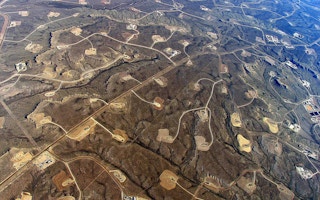Governments need to call an immediate halt to new coal, oil and gas projects if the world is to meet its climate change targets, a new report concludes.
The expected carbon emissions resulting from existing mines and oil and gas fields could amount to 941 billion tonnes – almost 100 million tonnes above the target that underpinned last year’s Paris climate agreement.
The analysis by the campaign group Oil Change International, based on data provided by independent oil and gas consultancy Rystad Energy, is a direct challenge to countries such as the UK, which has just pushed through plans for new onshore fracking for shale gas in Lancashire, northwest England.
The warning comes just after 31 countries joined the US and China to ratify the climate change agreement at a ceremony in New York.
Major contradiction
The UK has said it will also ratify the deal before the end of this year, but Oil Change International says its latest analysis points up a major contradiction.
“If the world is serious about achieving the goals agreed in Paris, governments have to stop the expansion of the fossil fuel industry,” says Stephen Kretzmann, executive director of Oil Change International. “The industry has enough carbon in the pipeline – today − to break through the sky’s limit.”
Greg Muttitt, author of The Sky’s Limit, a new report that contains the analysis, argues that previous studies on carbon budgets have focused on the burning of fossil fuels, but his analysis concentrates on what these budgets mean for the supply of fossil fuels in the first place.
It is the first time a study has looked at current fossil fuel extraction operations and made the logical conclusions based on climate science, he claims.
“
If the world is serious about achieving the goals agreed in Paris, governments have to stop the expansion of the fossil fuel industry.
Stephen Kretzmann, executive director, Oil Change International
“Once an extraction operation is underway, it creates an incentive to continue so as to recoup investment and create profit, ensuring the product – the fossil fuels – are extracted and burned,” Muttitt says.
“These incentives are powerful, and the industry will do whatever it takes to protect their investments and keep drilling. This is how carbon gets ‘locked-in’.
“It is not too late. It’s still possible to go another way. With a properly-managed decline of the industry, we can replace the fossil fuels with renewables quickly enough to meet our energy needs and climate goals.
“Perhaps more importantly, we can do so in a way that protects workers, communities and the climate.”
The Paris Agreement accepts that global warming must be kept at “well below” 2°C compared to pre-industrial levels, and under 1.5°C if at all possible.
There has been moratorium on new coal mines in China and elsewhere, but many countries have been following a twin track approach – taking action against climate change, but also increasing hydrocarbon use and production.
There has been a massive increase in US shale oil and gas output over the last five years, even while President Barack Obama takes steps to lower the country’s carbon emissions.
Norway is also a leader in “green” initiatives promoting hydro-electricity and electric cars, while still encouraging offshore oil and gas exploration.
Hard choices
The pace of new hydrocarbon projects worldwide has slowed over the last two years. But this is largely driven by low crude oil prices.
The Oil Change report says there is still $14 trillion of projected investment in new mines, fields and pipeline infrastructure planned by industry and government.
The report lists examples some of the biggest projects around the world that cannot go ahead – in the US, Canada, Australia, and Russia. It says governments will need to make hard choices about the phase-out of existing projects, and the report recommends this should start in the developed world.
May Boeve, executive director of the 350.org campaign group, says the analysis must be taken seriously.
“Our institutions must heed this warning and divest from this industry,” May warns. “And if our leaders are serious about keeping their promises made in the Paris Agreement, they now have to say ‘no’ to every new fossil fuel infrastructure project that comes across their desk. That carbon must be kept in the ground.”
This story was published with permission from Climate News Network.










